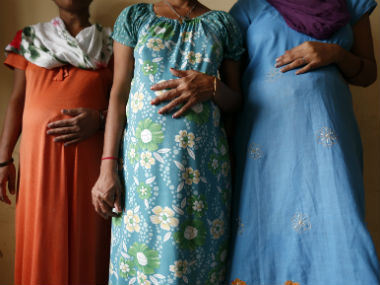A couple of years ago, when I started investigating the issue of Artificial Reproductive Technology (ART) and surrogacy for my book Baby Makers: The Story of Indian Surrogacy, this was a flourishing field. The fertility clinics were thriving, the surrogate homes were full. I had no problem at all accessing either the doctors or the surrogates or even the foreigners who had come to India to have their babies. The only persons who were hesitant to talk at that time were the Indian couples who were more worried about the social stigma. I, therefore, was able to conduct extensive interviews with various people involved across the country. This included fertility experts and lawyers who had worked with government agencies to make a proper Draft Bill to bring much-needed regulation in this area.
The Draft Bill has been in the making for more than a decade now. It has been through several avatars. There were some flaws which still had to be ironed out. But none of the drafts were as flawed as the one which was finally tabled last week. Instead of understanding and addressing the issues related to IVF and surrogacy which need to be regulated, the newly tabled Bill seeks to impose bans which will kill fertility treatment.
Only childless, heterosexual Indian couples who have been married for five years and are living in India can now avail of fertility treatment. And if they need to find a surrogate to carry the baby, they have to seek out a relative who will do it out of altruism. With this sweeping ban, the Bill negates the rights of parenthood to single persons, divorcees, widowed persons, single sex couples, live-in relationship partners and others who come outside the patriarchal norm.
Both IVF and surrogacy have been around for a long time now. The first Indian baby created through IVF was born in 1978. In those days, these test tube babies, as they were called, were born through “traditional” surrogates or women who supplied the eggs for the procedure and also carried the babies in their own wombs.
Gestational surrogacy came into vogue in the 1980s when doctors discovered they could safely implant such an embryo in the womb of a woman who had no biological connection with the baby.
Prior to these technological advances, a “traditional” surrogate was a woman with whom a man with an infertile wife would have sex. The baby which carried his genes would be handed over to him as soon as it was born. The surrogates were what would now be described as “altruistic”. The most favoured were poor relatives (because they had the acceptable genetic material) or dependents who could be coerced or bought over. Sometimes, the surrogate would be married off to the man with the wife’s consent and this too was socially acceptable. No one spoke of exploitation even though, as we all know, the family can sometimes be the most exploitative institution.
Even today, an altruistic surrogate coming from the family can be subjected to coercion and exploitation. She will certainly not have any enforceable cushion of compensation and care. The parents themselves would become open to blackmail at a later date, especially if there is no legal commitment on either side.
Today, fertility problems can be diagnosed and treated just like any other medical issue. Over the years, Indian fertility clinics have acquired state-of-the-art facilities and built up enough expertise which allows them to compete with their peers world-wide. All of this does not come cheap. In fact, fertility treatment is neither cheap nor painless. It requires money, determination and an ability to put up with setbacks.
Infertility could be caused by genetic or medical issues. For instance, if either of the partner’s gametes (eggs and sperm) are not viable, they would have to get them from euphemistically named donors who are actually compensated. If a woman is born without a womb, she would need to hire a surrogate to carry her child, a delicate and onerous job which also has to be properly compensated for.
Each country has its own rules regarding IVF and surrogacy. Many predominantly Christian countries in Europe do not recognise children born of surrogacy. But others like the US and several parts of Russia have flourishing fertility clinics. UK allows only altruistic surrogacy and has admitted that this model is a failure.
Earlier, people from countries where surrogacy was not recognised came to India for fertility treatment and tried to smuggle home their children born through surrogacy. When this failed, the children were caught in no man’s land. To end this problem, the Indian embassies were instructed not to issue fertility tourism visas to citizens of such countries. This effectively stopped the illegal inflow. But recently, the government went one step further and banned all foreign nationals from coming to India for fertility tourism. This retrograde step effectively cut off an important revenue source for the clinics and surrogates.
In India, until now, we have been going by the non-enforceable guidelines of the Indian Council of Medical Research (ICMR). There was a very strong need to introduce proper regulation because these guidelines were quite ineffectual. Sensing a money making proposition, many fly-by-night fertility centres with no lab facilities have sprung up serviced by seedy agents and quack doctors. These are the grey areas which the new bill was supposed to look into.
Today, surrogates sign a contract with commissioning parents. They earn about Rs 5 lakh by way of payment, sometimes more if they carry twins. The surrogate houses where they stay organise Baby Showers or ‘Seemantham’ where the women are often showered with gifts, including gold and money by the grateful parents. They are fed and housed during the duration of the pregnancy and all their medical bills are taken care of. Many told me they had much easier pregnancies now compared to when they carried their own children. Foreign couples in particular were known to give the women heavy extra tips and also sometimes rehire them for a salary to breast feed the babies for a few months. To the women who view this as a professional commitment, the money and streamlining of the process makes a lot of sense.
Contrary to what has been stated by the supporters of the new Bill, the surrogates are not an exploited lot. True, they come from an economically weaker section compared to the commissioning parents. But they view this as a job a means of earning money. In their own way, they are asserting their rights over their wombs.
I have interviewed many number of surrogates, both inside and outside the clinics and in various stages of their contractual commitment. Barring a very few who had some bad experiences like a spontaneous abortion, most of them were satisfied with their experience. Many told me they felt they had done something good by helping a childless couple to get their own miracle baby. And they had earned enough money to build a house or educate a child.
The Bill would do more justice if it addressed some important issues pertaining to the rights of the child and protection of the surrogates. Instead of banning perfectly law-abiding citizens from becoming parents, it should ban people with criminal records, human traffickers, organ traders and others with a dubious background. It should fix a proper and realistic age limit for the commissioning parents, surrogates and gamete donors. It should ensure the surrogates understand the contracts they sign and that they are covered by insurance. It should make it mandatory for the clinics to maintain proper records. It should make DNA tests compulsory to ensure the child carries the DNA of at least one parent. There are many more such nitty-gritty issues which need to be looked into. Blanket bans can never work in a sensitive area like this.
Artificial Reproductive Technology (ART) is an exciting new field which has a lot of potential for growth. And like any new technology, it brings in its wake a variety of moral and ethical questions which did not even exist before. Like the fire which can warm as well as burn, In Vitro Fertilization (IVF) and surrogacy can give the miracle of parenthood to human beings who crave for children of their own and, if misused it can lead to exploitation, blackmail and health issues.
Only those with a proper understanding of the entire process can bring in legislation which is pertinent and meaningful and seeks to nurture rather than kill.
(Gita Aravamudan is a journalist and author of the book Baby Makers: The Story of Indian Surrogacy.)


)




)
)
)
)
)
)
)
)